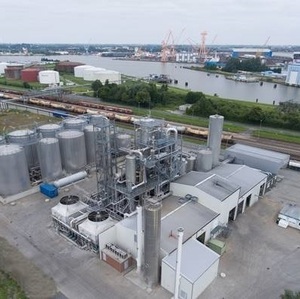REG reports increased revenue for Q4

March 3, 2022
BY Erin Krueger
Renewable Energy Group Inc. released fourth quarter 2021 financial results on March 1, reporting increased renewable diesel production for the period. Biodiesel sales were down slightly, while revenue was up significantly. REG did not host an earnings call to discuss its fourth quarter performance due to the Feb. 28 announcement that the company has entered an agreement to be acquired by Chevron.
REG sold 148 million gallons of fuel during the fourth quarter, down 2 percent from the same period of 2020. Self-produced North American biodiesel sales were down 9 million gallons driven primarily by the closure of the company's Houston facility in the quarter and other optimization choices. Self-produced European biodiesel sales were down 3 million gallons due to supply chain issues. Third party renewable diesel sales increased 8 million gallons, due to an increase in the sale of REG Ultra Clean gallons.
REG produced 122 million gallons of biodiesel and renewable diesel, a decrease of 5 percent. North American biodiesel production decreased 7 million gallons and European biodiesel production decreased 3 million gallons. Renewable diesel production at our Geismar, Louisiana facility increased 3 million gallons, due to the lapping of unplanned downtime in the fourth quarter of 2020 as well as continued strong run rates.
Advertisement
Revenue for the fourth quarter reached $882 million, up from $548 million. REG primarily attributed the increase to higher selling prices from a combination of an 86 percent increase in ULSD prices and a 69 percent increase in D4 renewable identification number (RIN) prices, partially offset by lower gallons sold.
Gross profit for the quarter was $84 million, up from $66 milllion. Net income available to common stockholders was $52 million, or $1.03 per share, on a fully diluted basis, compared to $27 million, or 60 cents per share on a fully diluted basis for the same period of 2020.
For the full year 2021, REG sold 621 million gallons, down 4 percent from 2020. North American biodiesel sales were down 27 million gallons, driven largely by optimization choices and the closure of the Houston facility. Lower margin petroleum diesel sales also decreased by 10 million gallons. These volume declines were partially offset by an 18 million gallon increase in the sale of third party renewable diesel gallons, due to an increase in the sale of REG Ultra Clean gallons.
Advertisement
REG gallons produced for the year decreased 7 percent, from 519 million gallons in 2020 to 480 million gallons in 2021. North American biodiesel production was down 32 million gallons, or 8 percent, primarily due to Houston shut down and production optimization choices cited above. Renewable diesel production was largely flat year over year in spite of the impact of Hurricane Ida on 2021 production.
Revenues for 2021 reached $3.2 billion, up from $2.1 billion in 2020.Gross profit was $370 million, up from $268 million. Net income available to common stockholders was $212 million, or $4.44 per share on a fully diluted basis for 2021, compared to $120 million, or $2.76 per share on a fully diluted basis for 2020.
Related Stories
The U.S. Energy Information Administration maintained its forecast for 2025 and 2026 biodiesel, renewable diesel and sustainable aviation fuel (SAF) production in its latest Short-Term Energy Outlook, released July 8.
XCF Global Inc. on July 10 shared its strategic plan to invest close to $1 billion in developing a network of SAF production facilities, expanding its U.S. footprint, and advancing its international growth strategy.
U.S. fuel ethanol capacity fell slightly in April, while biodiesel and renewable diesel capacity held steady, according to data released by the U.S. EIA on June 30. Feedstock consumption was down when compared to the previous month.
XCF Global Inc. on July 8 provided a production update on its flagship New Rise Reno facility, underscoring that the plant has successfully produced SAF, renewable diesel, and renewable naphtha during its initial ramp-up.
The USDA’s Risk Management Agency is implementing multiple changes to the Camelina pilot insurance program for the 2026 and succeeding crop years. The changes will expand coverage options and provide greater flexibility for producers.
Upcoming Events










